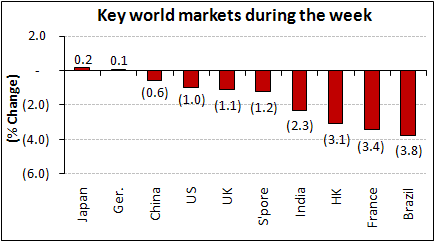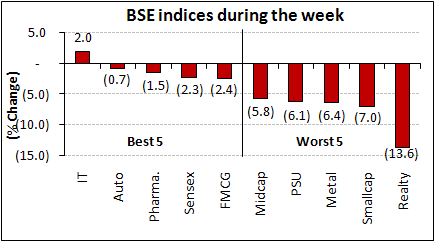India's Third Giant Leap
This Could be One of the Biggest Opportunities for Investors
- Home
- Todays Market
- Indian Stock Market News November 27, 2010
EU worries weigh on markets Sat, 27 Nov RoundUp
The week was largely lackluster with most of the global markets closing the week in the red. This was a result of European debt worries and tough talk from North Korea regarding the situation in the Korean peninsula. Japan was the top gainer for the week up 0.2% followed closely by Germany, up 0.1%. The biggest loser of the week was Brazil down 3.8%. In Asia, Hong Kong was the biggest loser down 3.1% followed by India (down 2.3%), Singapore (down 1.2%) and China (down 0.6%). The US was down by 1% during the week. In Europe, France was down by 3.4% while UK was down by 1.1%.
 |
| Source: Yahoo Finance |
Moving on to the performance of sectoral indices in India - baring BSE-IT index (up 2%) all the major indices were down this week. The biggest loser was BSE-Realty Index down 13.6%. BSE-Smallcap and BSE-Metal indices were part of the five worst performers of the week down 7% and 6.4% respectively. BSE-PSU (down 6.1%) and BSE-Midcap (5.8%) indices were also among the top losers of the week. Amongst the top performers of the week, BSE-Auto and BSE-Pharma indices were down by 0.7% and 1.5% respectively. Sensex (down 2.3%) and BSE-FMCG (down 2.4%) made up the remaining five top performing indices of the week.
 |
| Source: BSE |
Moving on to key corporate developments during the week - The biggest losers of the week have been realty stocks. Leading the losers in this space were HCC, India Infoline, LIC Housing and Indiabulls Real Estate. This has been on the back of the loans-for-bribe scam which broke out during the week. Readser may recall that earlier this week the CBI claimed to have busted a racket in which key executives in large finance companies sanctioned loans and disclosed confidential information in exchange for bribes. The finance companies include banks and India’s largest insurer (a state-owned firm). CBI arrested five executives from Life Insurance Corp. of India (LIC), LIC Housing Finance Ltd, Bank of India, Central Bank of India and Punjab National Bank (PNB) in relation to this scam. Also arrested by the CBI were three top executives at Money Matters Financial Services Ltd for acting as a middle man between the finance companies and corporates availing these loans.
In fact HCC faced a double whammy this week. The Union Environment Ministry on Friday issued a show cause notice to Lavasa Corporation Limited (LCL), a subsidiary of HCC. This notice is in relation to a number of constructions in Lavasa which the Ministry deems as 'violations.' The company has been given 15 days by the ministry to explain why it built structures in Mulshi and Velhe talukas without clearance. These areas lay 1,000 mt above the sea level and therefore require an environmental clearance from the Union Ministry. The notice states that in case LCL fails to give satisfactory answers, the Ministry can direct the unauthorized construction to be removed entirely. The Ministry can also direct a 'status quo' on further development and construction in Lavasa, pending the decision on the show cause notice. So far there has been no statement from LCL regarding this notice.
In news from the auto sector, in an attempt to give fillip to its international plans, Bajaj Auto is working to bring Australian bike maker KTM and Kawasaki of Japan together to form a global alliance. The three companies are discussing matters regarding cost-effective manufacturing programmes for engines, platforms and components, and also a global distribution and marketing set-up. It may be noted that Bajaj Auto has a 38.09% stake in KTM. KTM specializes in making stylish street and off-road bikes. Bajaj and KTM are currently in the process of developing a range of high-performance engines for both the domestic and international markets. This range of engines can be tapped by Kawasaki which is a long time technical partner of Bajaj Auto. Multiple use of similar engine is expected to lower the cost of manufacturing in the long run.
Moving the consumer goods sector, Nestle India is investing big time for ramping up its production. The company has earmarked over Rs 4.5 bn for investment in the calendar year 2010 taking the total capex investments to Rs 6.5 bn over the last three years. Nestle has indicated that the funds will be used for expanding facilities at Bicholim and Ponda in Goa, Moga in Punjab, Nanjangud in Karnataka, Samalkha in Haryana and in new greenfield facilities. The capex will be funded through a mix of internal accruals and debt. Nestle is a debt free company and this gives it sufficient headroom to borrow funds if required. This move is part of the company's strategy to continue investing in brands, distribution capabilities and capacities to capitalize on India's strong growth prospects. In fact the parent company is quite bullish about the prospects in India. Recently it increased its stake by 0.8% to 62.76% in Nestle India. The stake was increased through stock purchases in the markets.
In news from the healthcare space, it is believed that biotech drugs will be the next growth driver going forward in the pharma space. Biotech drugs, also called biologics, are drugs manufactured using live organisms, as against conventional medicines which are based on chemical compositions. In fact in the global pharma market, the top 2 drugs 'Lipitor and 'Plavix’ are set to lose their patents and biotech drugs are set to take their places. As a result of this huge opportunity in biotech space, estimated at over US$ 60 bn several Indian pharma companies are aligning their portfolios to corner this market. Companies such as Biocon, Dr Reddy’s, Glenmark and Cipla have been making biosimilars which are generic version of branded biotech drugs.
As a result of Biotech drugs requiring complex technology and high investment to manufacture they are niche and have the potential to generate higher revenues and profits. While the regulatory pathway in both the US and Europe is still hazy, opportunities exist in the domestic and the semi-regulated markets and Indian pharma companies have already begun launching products in these markets. It is estimated that by 2014 at least 6 of the 10 top-selling drugs sold globally would be injectable biotech drugs, mainly for treating cancer and rheumatoid arthritis, compared to five in 2008 and just one in 2000.
| Company | 19-Nov-10 | 26-Nov-10 | Change | 52-wk High/Low | |
| Top gainers during the week (BSE-A Group) | |||||
| JAIN IRRIG | 204 | 218 | 6.7% | 264 / 147 | |
| TORRENT POWER LTD | 276 | 288 | 4.3% | 374 / 274 | |
| GLENMARK PHARMA | 342 | 354 | 3.4% | 385 / 230 | |
| PETRONET LNG | 116 | 119 | 2.9% | 130 / 67 | |
| BHARAT ELEC. | 1,674 | 1,716 | 2.5% | 2,252 / 1,650 | |
| Top losers during the week (BSE-A Group) | |||||
| HIND. CONSTRUCTION | 59 | 40 | -32.0% | 81 / 52 | |
| IND. INFOLINE | 116 | 81 | -30.3% | 146 / 90 | |
| LIC HOUSING | 1,325 | 932 | -29.7% | 1,497 / 710 | |
| INDIABULLS REAL EST | 184 | 136 | -26.1% | 236 / 143 | |
| HOUSING DEV. INFRA | 240 | 179 | -25.6% | 392 / 195 | |
In economy related news, the Prime Minister Mr Manmohan Singh has stated that the government is making serious efforts to moderate inflation. India's annual headline inflation (WPI) eased slightly in October to a 10 month low but at 8.6% was still above the Indian central bank's comfort zone. Food inflation, which has been in double digits for over three months, has been described by the RBI as being responsible for the high overall inflation. However, India's annual food inflation eased for the fifth consecutive week in early November. This was due to new crop arrivals in the market. With this development expectations that the central bank would hold rates steady in the near term are beginning to build up.
On the other hand China is taking direct action to control inflation. The People's Bank of China said last week that it would raise the percentage of deposits that commercial banks need hold with the central bank by 0.5%. China’s State Council has said that it will adopt 16 measures to stabilize consumer prices. This would include temporary subsidies and price monitoring. However, China has stopped short of raising interest rates for now due to a fear of a rush of speculative money into the economy.
While developed economies continue to remain in uncertainty and negative news in domestic markets cause valuation multiples of some Indian stocks to erode, investors need to look out for fundamentals and valuations that can deliver safe and attractive returns over the long run.
For information on how to pick stocks that have the potential to deliver big returns, download our special report now!
Read the latest Market Commentary


Equitymaster requests your view! Post a comment on "EU worries weigh on markets". Click here!
Comments are moderated by Equitymaster, in accordance with the Terms of Use, and may not appear
on this article until they have been reviewed and deemed appropriate for posting.
In the meantime, you may want to share this article with your friends!